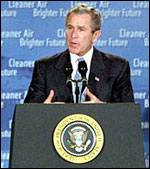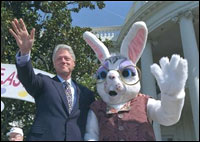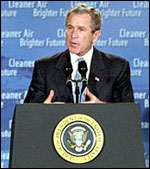
He’s bad, but is he the baddest?
Photo: White House.
Ask 10 environmentalists and 9 will tell you George W. Bush has been worse for the planet than Bill Clinton — and they would be wrong. In their error lies much that is ill in the environmental movement (if “movement” it can be called) and shows how long are the odds against righting the wrongs of the industrial economy.
But first, how can the man who would drill in the Arctic and the Rocky Mountain Front, who wants arsenic in your O.J. and snowmobiles in Yellowstone, to whom global warming is an evolutionary byproduct — how can he be ecologically on par with his predecessor? Arch-leftist Jeffrey St. Clair doesn’t deny that Bush is ruinous for the environment. But he says (Oil) Slick Willie was at least as bad thanks largely to greens — specifically, big greens.
“Once the environmental movement was seen as a public interest movement of unimpeachable integrity,” St. Clair writes in Been Brown so Long It Looked Like Green to Me. But by the age of Clinton, “mainstream environmentalism had become fattened and tongue-tied by foundation grants (many originating from the fortunes of big oil) and blindered by a reflexive loyalty to the Democratic Party.” For their fealty, the Audubons and Sierra Clubs were rewarded with scraps, like the appointment of a green to a minor post. Think Jim Baca, director of the Bureau of Land Management, who tried to raise public grazing fees only to be cuffed by the corporate greens Clinton installed above him. That lot included Interior Secretary Bruce Babbitt (the pro-overgrazing, pro-strip-mining ex-governor of Arizona distinguished for draining the Colorado River for Phoenix’s sprawl barons) and EPA Administrator Carol Browner (who handed the Everglades to sugar growers and, as an encore, tried to repeal the ban on detectable carcinogens in processed foods). Per St. Clair, the scraps thrown to greens worked. When Clinton betrayed the environment, environmentalists, afraid of jeopardizing their meager spoils, looked the other way.
Take Clinton on ancient forests. During the Bush I administration, greens convinced a federal judge to temporarily stop logging on 6 million acres of old growth in the Pacific Northwest. Clinton took office, held a feel-your-pain timber summit, and promised to both protect old growth and get out the cut. Federal scientists created eight options to do just that, but none moved enough logs for industry. So Clinton ordered a ninth option, science be damned. It trimmed logging from the Reagan-era bonanza but not to scientifically defensible levels. Nor did it permanently protect even an acre of old growth; clearcutting continued apace in the most ancient of stands. When the plan was questioned, the White House shredded the documents that exposed the science behind Option 9 as bogus.
Clinton gave greens a choice on Option 9: End the court’s ban on logging by settling the case and accept more than a hundred timber sales in ancient forests, or he and Congress would override the injunction. Big greens dutifully hailed Option 9 a victory. Encouraged, Clinton named the “scientist” behind Option 9, Jack Ward Thomas, to head the U.S. Forest Service. Greens applauded Thomas’ appointment and were rewarded with the biggest timber sale in decades — a massacre of ancient groves in Alaska’s Tongass National Forest. Only in Dubya’s dreams could he get away with such a streak.

Clinton didn’t hop to it
on the environment, says St. Clair.
Photo: White House.
And that is but one crime Clintonian. St. Clair adds to it flip-flops on global warming and the BTU tax, kowtowing to Detroit on fuel standards, passing a green-busting NAFTA, consigning Snake River salmon to extinction, drilling in the National Petroleum Reserve (an Alaskan wilderness bigger than the Bush-threatened Arctic National Wildlife Refuge), and much else. Even Clinton’s victories were gilded, as with the Grand Staircase-Escalante National Monument, where road-building and mining are sanctioned.
Didn’t hear much about the above? That would be because mainstream environmental reporters don’t stray far from mainstream greens. If the latter aren’t howling, the former think there mustn’t be much to fret about.
Been Brown So Long is a grab bag of St. Clair’s reportage, mostly published in CounterPunch, the scrappy newsletter he coedits with Nation columnist Alexander Cockburn. The book is a godsend for documenting much that the “respectable” media passed over, from the aforementioned grand injustices to less-considered ones like lingering fallout from nukes tested in the 1950s and the ruin of Native holy ground for Vatican observatories. The pace is brisk, the temperature in a narrow range from simmering to boiling. It should — but is too heterodox to — be read and debated in college environmental studies programs.
Its main defects are two (not counting the proofing; would Common Courage Press please hire a copy editor?). Like most compendia, Been Brown So Long is short on unifying analysis. St. Clair makes a small effort in an introductory chapter, but a more considered diagnosis would have helped the reader understand whether the symptoms he so thoroughly reports signify a bad but passing cold or metastasizing cancer. Also, St. Clair tends to overplay individual ills: a $250,000 salary at the National Wildlife Federation, a Wilderness Society president who chainsawed old growth on his ranch. These make delightful copy, but so many, so salacious, and above all so personal are these sins, readers may think putting purer souls atop the environmental lobby or in the White House could save everything. Nothing could be less true.
The meaning — at least the meaning I extract — from Been Brown So Long is that even a better president could do better only marginally, at least at present. Clinton wiggled, waffled, and laid waste not just because he was Clinton but because a profit-driven economy must ignore all but the most drastic of environmental limits (and even many of those). So long as our standard of living depends on getting the cut out, then the cut, literal and metaphorical, must be got out. This seems inescapable, yet most greens will tell you things would be pretty much OK with John Kerry in the White House.
A few things would be better. But in our economy, any president must commit evil in excess of good, and bad as Bush is, a kinder, gentler replacement would probably commit the still worse crime of lulling greens to sleep with minor blessings. Meanwhile glaciers melt. That even greens cannot see this speaks to the stubbornness of the barriers before us.
What to do? In the near term, both the big greens and the Democrats must be treated like the politicians they are. They must be called to account for their trespasses, and we must not hesitate to go around them, which means, among other things, voting third party when wise. The anti-globalization protestors (many, of course, are environmentalists) have this principle down: Build a swell from the bottom that cannot be ignored; remain independent of established interests while bullying them to join.
In the far term, St. Clair rightly says that we have lost the war of big ideas. Industry’s idea was that environmentalism will cost you your job. We need to elevate an opposing notion — something like, what good is a job that kills your kids? We also need to recognize that the free market’s “externalities” are nothing of the sort, that regardless of who is president, the system is jimmied for profit and against people and place. We need a new (not a reformed) system. What that system should be and how it might emerge is itself a book, or a hundred.



